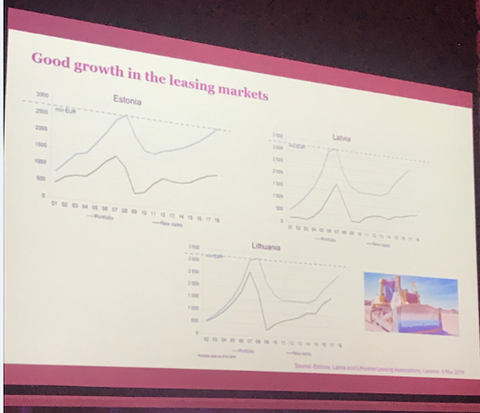BALTIC STATES
The Baltic tigers are roaring once more
Estonia leads the trio of Baltic States in adapting asset finance for the 21st Century.

Slide demonstrating strength of asset finance in Baltic countries compared to EU27 overall
While growth in the leasing sphere was reasonable from 2004 to 2007, the ‘Baltic tigers’ of Estonia, Latvia, and Lithuania experienced rapid growth in this time. In the past few years this growth is returning for the area, helped by the fact that in the words of Reet Hääl, chief executive officer of the Estonian Leasing Association, this is a “modest country that extends beyond its borders” in the digitalisation sphere.
“we were known as the 'Baltic tigers'. Unfortunately from 2008 to 2010 we were called 'Baltic losers'”.
Jevgenjis Belezjaks
As Jevgenijs Belezjaks, chairman of the board, chief executive officer Baltic region, SIA UniCredit established at the Leasing Life conference in Tallinn, Estonia, economic boom periods can be seen as coming in ‘waves’. Currently the Baltic states are riding the wave, and should be an arena of optimism: “Some may say the improvement is there but so is the volatility, while other parts of Europe have been developing much more consistently. Yet even with the volatility, culmulative growth in Baltic states since 2004 has been much more than the EU27 as a whole.”
Tõnu Palm, chief economist at Luminor Bank Estonia, is able to reassert the firm statistics showing the Baltic states regrowth in the leasing sector: “Of new vehicles purchased around 70% have been leased, which tells us something is working in this sector. Apart from manufacturing the biggest contribution to Estonian GDP has been the ICT sector, which has been growing hugely fast. This can impact the industry in all sorts of ways, even including the levels of technology required for a fully automated dairy farm.”
“If you look at value terms in Estonia we have just about reached the pre-crisis peak.”
Tõnu Palm
Unfortunately, Estonia’s international reputation for financial services have been severely damaged by allegations of $250bn of laundered money going through the Tallinn branch of Danske Bank. According to statement from Danske Bank: “the problems related to the Estonian branch were much bigger than anticipated when we initiated the investigations,” Leasing has long been a target of money launderers, and greater international investment in the Baltics may not come until the conclusion of the US Department of Justice investigation into what may turn out to be the largest case of its kind in history.
A walk round the city of Tallinn will show a country that combine the old with the new, the medieval walls enveloping a hub of digitalization. This combination can be applied to the leasing industry, but there cannot be naiveté here either. There has been volatility in the region, and potential interaction with Russia can still cause damage for the Baltic states, as evidenced in the aforementioned money laundering scandal which was closely linked to Russian criminal organisations. So caution perhaps, but also optimism that this area that has pioneered in so many fields already can lead the way in leasing, an area it has a proven track record.